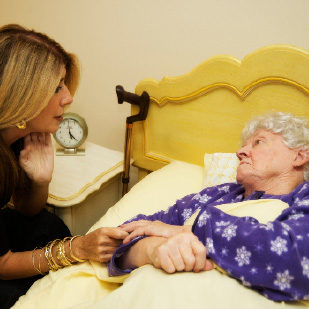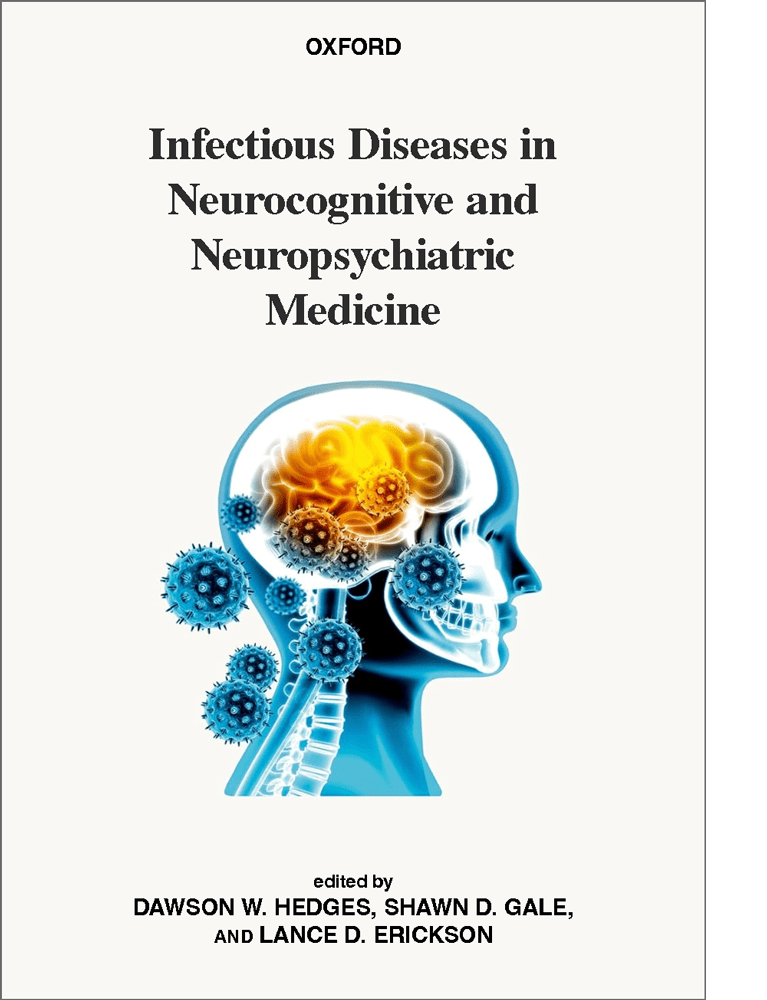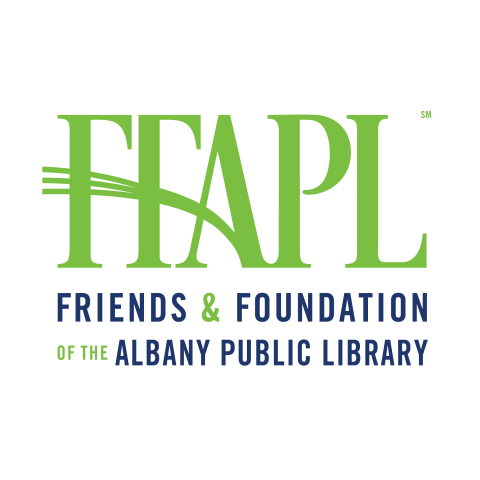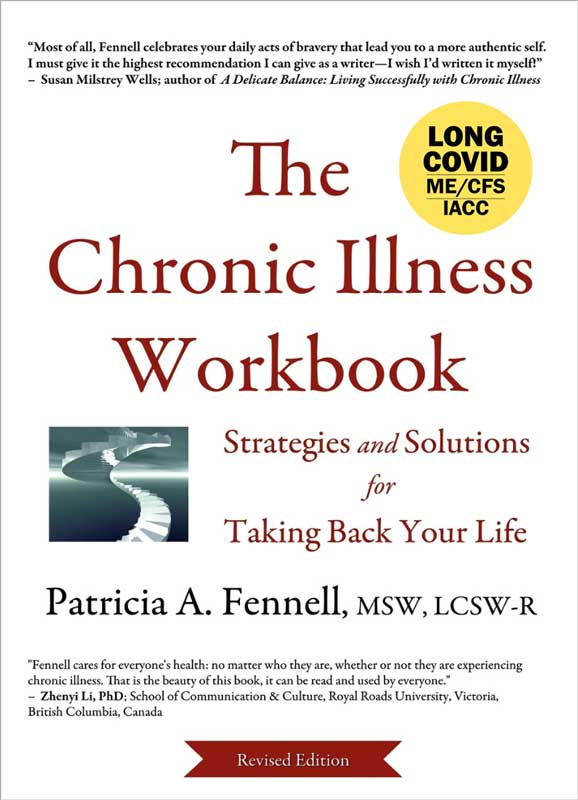Ch 22
The Possible Infectious Origins of Myalgic Encephalomyelitis/Chronic Fatigue Syndrome and Fibromyalgia and Other Infectious Diseases Causing Cognitive Consequences
Kenneth J. Friedman, Ilene S. Ruhoy, Patricia A. Fennell, Shane George
Infectious Diseases in Neurocognitive and Neuropsychiatric Medicine
To Purchase
Friends & Foundation of the Albany Public Library
Join Patricia Fennell, MSW-CSW-R, President/CEO. Albany Health Management Associates, Inc., discusses & reads from her book, The Chronic Illness Workbook: Strategies and Solutions for Taking Back Your Life.
Tuesday, November 19, 2024 • 2:00pm – 3:30pm
Washington: Large Auditorium
2024 Massachusetts ME/CFS & FM Annual Event: A Powerful Paradigm for Living with Chronic Illness
Patricia Fennell, MSW, CSW-R
Guest speaker
October 26, 2024 • Massachusetts ME/CFS
ME/CFS, Long COVID, and Other Infection-Associated Chronic Conditions
October 4, 2024 • UMass Chan Medical School
Introduction to ME/CFS, Long COVID and IACCs: Shared complexity and health inequity—Hayla K. Sluss, PhD, Department of Medicine, UMass Chan, RECLAIM study lead PI
ME/CFS and Long COVID: Clinical Considerations from a Phase Perspective—Patricia Fennell, MSW, CSW-R, President/CEO, Albany Health Management Assoc., Inc
UnMasking PEM: Assessing disability and its pathophysiology using the 2-day Cardio-Pulmonary Exercise Test—Staci Stevens, MA, Founder, Workwell FoundationTodd Davenport, PhD, MPH, Professor, Chair in the Dept. of Physical Therapy, University of the Pacific, Stockton, California, Chair, Long COVID Physio
Critically Acclaimed Books by Patricia Fennell
Readers, including doctors, nurses, therapists, counselors, patients and families, gain a greater understanding of the psychological, social and physical impact of chronic illnesses, such as cancer, arthritis, MS, chronic pain, fatigue and depression.
Learn More >
OXFORD BIBLIOGRAPHIES ONLINE—CHRONIC ILLNESS ANNOTATED CHAPTER UPDATED
Among our inclusion of many newer editions of formerly cited works, several sections and subsections in the annotated bibliography were either removed, added, or revised to accurately reflect the current sociopolitical climate. For instance, the COVID-19 pandemic has birthed the persistent, long-form post-viral condition termed “Long Covid.”
Selected as an Editor’s Choice Article >
 The MDPI publication, Healthcare: Elements of Suffering in Myalgic Encephalomyelitis / Chronic Fatigue Syndrome
The MDPI publication, Healthcare: Elements of Suffering in Myalgic Encephalomyelitis / Chronic Fatigue Syndrome
People who are severely and very severely affected by Myalgic Encephalomyelitis / Chronic Fatigue Syndrome (ME/CFS) experience profound suffering. This suffering comes from the myriad of losses these patients experience, the grief that comes from these losses, the ongoing stigma that is often experienced as a person with a poorly understood, controversial chronic illness, and the trauma that can result from how other people and the health care community respond to this illness.
“Few people understand what it is like to live with ME/CFS. Trying to explain it to others can be exhausting and frustrating. I just found your wonderful article on ME/CFS in Healthcare which describes the physical, the psychological, and the social effects of this illness with compassion and clarity. It’s exactly what so many people, especially providers, need to hear. I will be recommending it widely.”
—Lynn Fuentes, JD, PhD
Long COVID
As the pandemic took hold in the United States in March 2020, Caroline, a healthy, athletic woman in her late 20s, began to feel unwell. There was no COVID-19 test to be had at that point, but she called her clinicians to describe mild to moderate symptoms such as fever, respiratory difficulty, gastro-intestinal irritation, and loss of taste and smell — which came and went, and not all at the same time.
PAPIS — Post Active Phase of Infection Syndromes
New Topical Collection — “Why Some Patients Never Fully Recover: Post Active Phase of Infection Syndromes (PAPIS)”
Healthcare Journal’s new topical collection includes descriptions of syndromes satisfying the broad case definition of PAPIS, improved case definitions of the diseases satisfying the PAPIS criteria, proposed mechanisms of pathophysiology, outcomes of treatment trials and case reports of PAPIS diseases, and both pharmacological and non-pharmacological approaches to PAPIS patient management.
Because of the unprecedented number of PAPIS patients anticipated worldwide in the wake of the COVID-19 pandemic, manuscripts concerning the economic, public health and societal experiences of PAPIS patients fall within the purview of the PAPIS Topical Collection.
Scleroderma
6th Annual Interprofessional Education
Focus on Scleroderma
Diagnosis. Awareness. Research. Education
April 12, 2023
EULAR 2022
(European Alliance of Associations for Rheumatology)
June 1-4, 2022
- N. Dorr, P. Fennell, L. Shapiro:
Published Abstract: “Correlates of Cancelled Healthcare Appointments in Patients with Systemic Sclerosis During the COVID-19 Pandemic” - H. Bowen, M. Morgan, L. Shapiro:
Poster Presentation: “Patient-Centric Interprofessional Education as a Means to Increase Health Professional Students’ Awareness and Understanding of Scleroderma”
7th Systemic Sclerosis Congress
March 10-12, 2022
Poster Presentations:
- “Correlates of Cancelled Healthcare Appointments in Patients with Systemic Sclerosis During the COVID-19 Pandemic”
- “Positively Impacting Patients with Scleroderma Through Interprofessional Education: An Emerging Approach”
Scleroderma is as common as multiple sclerosis, and more common than cystic fibrosis — yet the latter two are household words, while scleroderma remains relatively unknown.
Systemic sclerosis, which can emerge slowly or suddenly, combines three features: autoimmunity (if blood tests are performed, there are almost always auto-antibodies present), fibrosis (excess collagen deposits in the skin, and sometimes in the lungs, heart, or liver), and vascular (blood vessel) disease. Early on, scleroderma can present with puffy hands, numb hands (carpal tunnel syndrome), discolored fingers, heartburn or difficulty swallowing bread or meat, and occasionally, cough and shortness of breath. Skin thickening can vary greatly in extent, almost always involving the digits, sometimes the face, less often rapidly spreading to involve the upper arms and legs and even the chest.
Read More >
ACR Convergence ̶ Annual Meeting, American College of Rheumatology
November, 2021
“Connect & Thrive Together”
July, 2021
Virtual National Scleroderma Conference
When people affected by scleroderma connect, they create a powerful energy that helps them thrive throughout the year.
-
“Scleroderma: A Model Disease for Interprofessional Education”
-
“Scleroderma Interprofessional Education: A Patient-Centric, Collaborative Approach”
- To learn more about collaborating in our IPE, please complete form
Using Restorative Phase Practices (RPP)™ in Trauma’s Aftermath
We propose that violence and harm to others is rooted in disconnection. The Navajo Nation answers the question as to why people harm others by responding that “a person who does harm to another ‘acts as if he has no relatives.’”
The Fennell Four Phase Treatment Model (FFTM)™ (Fennell,P.,2003; 2012), speaks of “imposed change” being a root cause of disconnection. Imposed change is defined as events brought into our lives beyond our control. Such change may be experienced in the form of violence; incarceration of a family member; illness; or foster care placement, etc. They may yield negative impacts including decreased ability for relationship; alcohol or other drug abuse; acting out behavior; and/or psychiatric dissociation. Imposed change may also present opportunities to develop new skills, healing and restoration.
Read More >
Finding Normal After the Volunteer Experience
Events during volunteering trigger counter-transferential reactions. When returning to one’s home country, reverse culture shock may also occur after many weeks of stressful work and difficult living conditions. Individuals may develop symptoms of chronic depression, grief, posttraumatic stress disorder (PTSD), and disappointment and conflict with their home culture and family.
Read More >
Medical Residency Pilot Project:
We received internal review board approval to launch the AHMA/University of Michigan Chronic Illness Medical Residency Project. Dr. Namita Sachdev and Patricia Fennell introduced the project and surveyed residents.
Learn More >
Norwegian Health Care Program Development
Albany Health Management Associates, Inc. consulted to the Norwegian delegation in the development of a user-driven assessment, treatment, and research program for HIV/CFS/ME for physicians, clinicians, and patients.

























